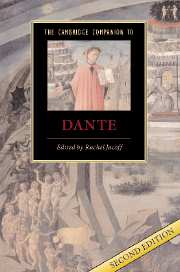Book contents
- Frontmatter
- 1 Life of Dante
- 2 Dante and the lyric past
- 3 Approaching the Vita nuova
- 4 From auctor to author: Dante before the Commedia
- 5 Introduction to Inferno
- 6 Introduction to Purgatorio
- 7 Introduction to Paradiso
- 8 Dante and the Bible
- 9 Dante and the classical poets
- 10 Allegory and autobiography
- 11 A poetics of chaos and harmony
- 12 The theology of the Comedy
- 13 The poetry and poetics of the creation
- 14 Dante and Florence
- 15 Dante and the empire
- 16 Dante and his commentators
- 17 Dante in English
- Further reading
- Index
- Series List
17 - Dante in English
Published online by Cambridge University Press: 28 May 2007
- Frontmatter
- 1 Life of Dante
- 2 Dante and the lyric past
- 3 Approaching the Vita nuova
- 4 From auctor to author: Dante before the Commedia
- 5 Introduction to Inferno
- 6 Introduction to Purgatorio
- 7 Introduction to Paradiso
- 8 Dante and the Bible
- 9 Dante and the classical poets
- 10 Allegory and autobiography
- 11 A poetics of chaos and harmony
- 12 The theology of the Comedy
- 13 The poetry and poetics of the creation
- 14 Dante and Florence
- 15 Dante and the empire
- 16 Dante and his commentators
- 17 Dante in English
- Further reading
- Index
- Series List
Summary
. . . adventures and scenes more wild than any in the Pilgrim's Progress.
Thomas Warton (1728-90)The translation, imitation, and contestation of Dante in English shows no signs of abating after six hundred years. The waning of scholasticism, the Reformation, the rise of new nation-states (including Italy, Ireland, and the United States), the two World Wars, the sectarian violence of Northern Ireland, and the struggles of African-Americans have all been articulated through readings and rewritings of Dantean texts. The first part of this history is easy to narrate: the painstaking intelligence with which Chaucer, Milton, and Shelley respond to Dante is easily distinguished from the general ignorance and imaginative feebleness that prevails in the first four centuries. Thereafter things become more complicated: an American Dante comes into being; Pound and Eliot connect American, English, and continental traditions; an Irish Dante (Yeats, Joyce, Beckett, Heaney) achieves things that are beyond the grasp of the English or Americans. Interest in Dante has, if anything intensified in the last few years. This survey begins with a secure origin - Chaucer's De Hugelino Comite de Pize - and works forward to an imperfect, Farinata-like vision of our own immediate future.
Chaucer's decision to lift the Ugolino story from Inferno 33 for his Monk's Tale set a trend that has never been broken: the Ugolino episode has been translated into English more times than any other Dantean passage (Paolo and Francesca run a poor second).
- Type
- Chapter
- Information
- The Cambridge Companion to Dante , pp. 281 - 304Publisher: Cambridge University PressPrint publication year: 2007
- 1
- Cited by

